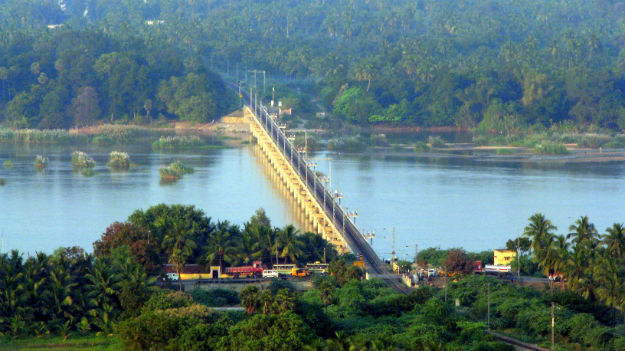Cauvery: An issue that could have been resolved 28 years ago: Expert
M CHENNA NAGRAJ
 NEW DELHI : Are the contending Cauvery riparian states are now left to grapple with the Supreme Court’s judgment, an issue they could have arrived at, virtually on the same terms and conditions 28 years ago.
NEW DELHI : Are the contending Cauvery riparian states are now left to grapple with the Supreme Court’s judgment, an issue they could have arrived at, virtually on the same terms and conditions 28 years ago.
The answer is yes, if the words of a senior Karnataka water expert who chooses to remain anonymous is to be believed.
 NEW DELHI : Are the contending Cauvery riparian states are now left to grapple with the Supreme Court’s judgment, an issue they could have arrived at, virtually on the same terms and conditions 28 years ago.
NEW DELHI : Are the contending Cauvery riparian states are now left to grapple with the Supreme Court’s judgment, an issue they could have arrived at, virtually on the same terms and conditions 28 years ago.The answer is yes, if the words of a senior Karnataka water expert who chooses to remain anonymous is to be believed.
The expert at that time was only a middle level technocrat when the then Chief Minister Veerendra Patil held a meeting of irritation department at his home office in early 1990s. It was the time when Karnataka was desperately seeking to find a mutual solution to the vexed riparian issue that had eluded a fanality ever since the lapse of 1924 agreement in 1974. If no solution was founded the Union Government would be constrained to appoint a Tribunal under the Inter State River Disputes Act 1956 to adjudicate the matter.
At that meeting, chief minister Patil wanted to know the quantum of water the state could safely release without jeopardising the interests of Karnataka farmers. The Irrigation Department Secretary or other top bosses didn’t have a ready answer. The expert is now retired from service was a fairly junior technocrat at that point but now leading figure on inter-state river disputes in Karnataka. Being a junior official, he was hesitant to speak out in the open meeting.
He caught caught mumbling to the ears of his boss — Irrigation Secretary by the CM who ordered him to address the meeting and not his boss. “Don’t worry. You are speaking under my instructions”, Mr Patil prodded. A official conversant with facts hesitatingly gave out his assessment on water situation in both states of the basin. “We can release 80 TMCFT of water in a difficult year and 175 TMCFT in a normal year”, was his view.
An impressed Mr Patil borrowed a piece of paper from his Secretary P P Prabhu and scribbled the figures keeping it isafe in his pocket dismissing the meeting a few minutes later.A couple of days later, Mr Patil was seen carrying the same bit of paper at his meeting with his TN counterpart M Karunanidhi. Karnataka’s offer of water release was also the same as scribbled.
Mr Karunanidhi, though was expressly satisfied with the offer but was reluctant to accept it officially fearful of the political repercussions. “He obviously opted the matter to be adjudicated by the tribunal”, as a safe measure the official recalled. The result was that the talks broke and the Centre was forced to set up the Cauvery Water Disputes Tribunal (CWDT) in early 1990s followed by a bitter prolonged legal battles in the Tribunal, the Supreme Court and a full throated agitations in both states all these years.
oooo
Meanwhile, Describing the Supreme Court verdict on Cauvery river water dispute as “unfavourable” to Karnataka, former Prime Minister H.D. Deve Gowda demanded to know what the State Government’s action plan was to prevent the Centre from forming the Cauvery Management Board. The Apex Court had directed the Centre to constitute the board in six weeks’ time.
Mr Karunanidhi, though was expressly satisfied with the offer but was reluctant to accept it officially fearful of the political repercussions. “He obviously opted the matter to be adjudicated by the tribunal”, as a safe measure the official recalled. The result was that the talks broke and the Centre was forced to set up the Cauvery Water Disputes Tribunal (CWDT) in early 1990s followed by a bitter prolonged legal battles in the Tribunal, the Supreme Court and a full throated agitations in both states all these years.
oooo
Meanwhile, Describing the Supreme Court verdict on Cauvery river water dispute as “unfavourable” to Karnataka, former Prime Minister H.D. Deve Gowda demanded to know what the State Government’s action plan was to prevent the Centre from forming the Cauvery Management Board. The Apex Court had directed the Centre to constitute the board in six weeks’ time.
Referring to the memorandum submitted by Tamil Nadu Chief Minister Edappadi K. Palaniswamy to Prime Minister Narendra Modi on the occasion of launching “Amma Scooter Scheme” to set up Cauvery Management Board, the Janata Dal (Secular) patriarch said the Congress Government has no plans to counter Tamil Nadu’s move.
Accusing both the ruling Congress and Opposition BJP of “not protecting the interest of over three-crore people in the Cauvery basin” Mr. Gowda said. He sought to know who would be responsible in case the Centre goes ahead with its decision to constitute the Cauvery Management Board to please Tamil Nadu “to teach a lesson to Congress in Karnataka.” (With Agency Inputs).

